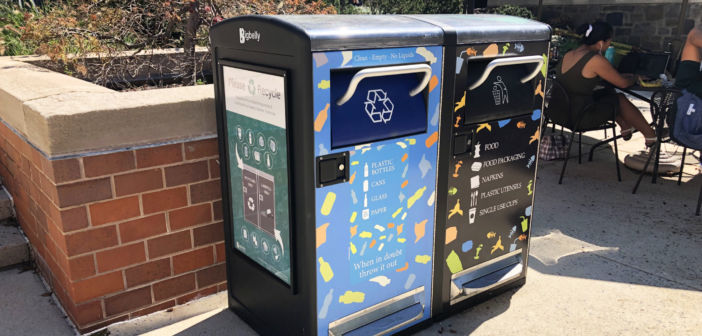Lehigh’s Campus Sustainability Plan 2020 is in place to guide the university’s integration of campus-wide eco-friendly efforts.
In May 2016, Lehigh implemented the proposal with plans to complete it by 2020. The interdisciplinary and interdepartmental effort established an overarching vision for sustainability, with short-term goals to achieve over the course of four years.
With construction around campus, the plan included a standard on sustainable building.
“I think, personally, the new standard for construction has had the single biggest impact,” Eco-Rep Jordan Ober, ’20, said. “When you have efficient building, you cut down on water waste and energy usage, and it’s so much more sustainable.”
According to the sustainability plan progress reports, 40 percent of Lehigh’s construction and demolition materials have been diverted through recycling and other forms of waste recovery.
Lehigh installed more than 40 water bottle refill stations on campus, eliminating the use of over one million plastic water bottles so far. 60.81 percent of materials throughout campus were diverted from landfills and incinerators by executing initiatives such as recycling, composting, donating and re-selling.
Members of Lehigh’s Eco-Reps, such as Ober, work toward the success of the 2020 plan.
Eco-Reps help engage students in environmental initiatives on campus by hosting events and raising awareness in residence halls, Greek houses and other on-campus housing.
“Recycling is huge,” Ober said. “The Campus Sustainability Plan has pretty high standards, and we’re trying to focus on creating mindfulness for recycling and food waste.”
The group works hard to educate students on what can and can’t be recycled. Many students are unaware that some plastic, paper and glass items can’t be recycled.
Skylar Davis, ’21, the Eco-Rep for Alpha Tau Omega, started using reusable cups in his house instead of the unsustainable stream cycle six cups.
“Pizza boxes are a common example of something that can’t be recycled,” Davis said. “The grease that the pizza leaves behind makes them unrecyclable.”
The Eco-Reps host events throughout the year encouraging students to recycle. The group is planning a Game Day Challenge during Lehigh’s home football game against Merrimack on Saturday, Sept. 28.
“We’ll be there, letting tailgaters know how they can be sustainable and mindful while they’re tailgating,” Ober said.
With the 2020 plan nearing its completion, the Lehigh Sustainability Council is tasked with crafting its newest edition.
The Lehigh Sustainability Council — a group of faculty, staff and students — collects input from the campus community, advises Lehigh’s senior leadership on environmental priorities and creates initiatives to implement necessary proposals.
Mark Ironside, the co-chair of the Lehigh Sustainability Council, said the council is beginning to work on the next plan, which focuses on waste diversion.
“The most important way to impact recycling is having nothing to recycle,” Ironside said. “Our priorities are to divert food waste, reduce packaging coming onto campus and avoid contamination of recyclable containers.”
The time frame for the new plan is still developing, but Ober believes it will be just as successful as the 2020 plan.
“When there’s a standard Lehigh will be held to, it makes all the difference,” Ober said.






Comment policy
Comments posted to The Brown and White website are reviewed by a moderator before being approved. Incendiary speech or harassing language, including comments targeted at individuals, may be deemed unacceptable and not published. Spam and other soliciting will also be declined.
The Brown and White also reserves the right to not publish entirely anonymous comments.